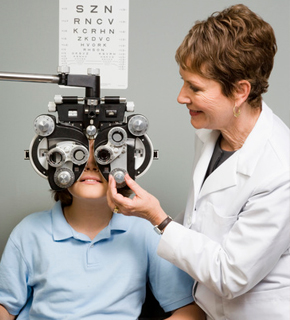Comprehensive Eye Exam
An eye fixed exam includes not only checking to find out if you need glasses. During an extensive eye exam, we not just determine your prescription for glasses or contact lenses, additionally we assess your eyes’ capacity to interact together (binocular vision). The dilated portion of the comprehensive eye exam allows us check for eye diseases such as glaucoma, cataract, and macular degeneration; and helps us evaluate your vision for signs and symptoms of systemic disease such as diabetes, high blood pressure levels, even brain tumors. Adults and kids needs to have routine eye exams to keep prescriptions current and also to look for early indications of eye diseases. Early detection can prevent vision loss.
Here is a set of a few eye conditions and eye diseases that people try to find during a comprehensive eye exam:
Refractive error: This is the eyes’ “optical” prescription. There are 3 kinds of refractive error, myopia (nearsightedness), hyperopia (farsightedness), and astigmatism (irregular contour around a person’s eye which leads to two separate things). These conditions can be corrected with glasses, contacts, and refractive surgery.
Presbyopia: This is the eyes inability to focus up close. This occurs because of the aging process. This problem may be corrected with glasses, lenses, and refractive surgery.
Amblyopia: Amblyopia is poor growth and development of central vision due to a turned eye or a large asymmetry (difference) in refractive error forwards and backwards eyes. If untreated, amblyopia can slow visual growth and development of the affected eye, be responsible for permanent vision loss.

Strabismus: Strabismus is surely an eye that turns inwards or outwards compared to another eye. If not dealt with, a strabismus can lead to amblyopia, and reduce depth perception.
Glaucoma: Glaucoma may be the degeneration with the optic nerve (a nerve tract that connects and transmits information from your eye towards the brain) often related to high eye pressures. Throughout a comprehensive eye exam, we perform numerous tests that reveal whether or not you have glaucoma. Because there are without any symptoms, you should have regular eye exams to prevent permanent vision loss.
Macular degeneration: Macular Degeneration can be a ailment that affects the little “sweet spot” (macula) from the retina critical for acute central vision tasks including reading, driving, and watching television. A comprehensive examination can detect the problem ongoing.
Cataracts: A cataract is a clouding from the crystalline lens which rests just behind the coloured section of the eye. Once cataracts develop patients often feel as though they are searching through a grimy window pane, which could cause signs of glare through the night.
Systemic diseases: A thorough eye exam can detect early indications of many systemic diseases including diabetes and high blood pressure.
To learn more about Irvine Eye Doctor net page: check it out.
